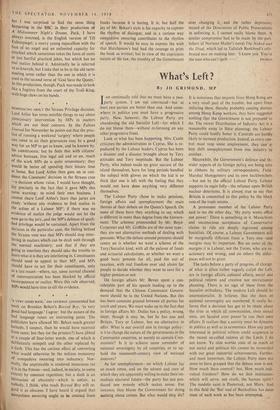'A VERY GOOD BOOK,' our reviewer commented last week on
Brendan Behan's Borstal Boy, 'in very good bad language.' 1 agree : but the nature of the bad language raises an interesting point. The Publishers have allowed Mr. Behan much greater latitude, I suspect, than he would have received from most; but they (or the printers?) have jibbed at a couple of four-letter words, one of which is deliberately misspelt and the other replaced by a dash. This has the curious effect of converting what would otherwise be the tedious monotony of compulsive swearing into indecency. Nor- mally, the unprintable is rendered innocuous (as it is in the Forces—and, indeed, in society, to some extent) by constant repetition; but a dash is an intimation of obscenity—which is unfair, as nobody, I think, who reads Borstal Boy will re- gard it as obscene. I have heard it argued that compulsive swearing ought to be omitted from books because it is boring. It is; but half the joy of Mr. Behan's style is his capacity to capture the rhythm of dialogue, and in a curious way compulsive swearing contributes to the rhythm of speech. It would be easy to express the wish that Hutchinson's had had the courage to print the book as written; but in view of the capricious nature of the law, the timidity of the Government over changing it, and the rather depressing record of the Directorate of Public Prosecution's in enforcing it, I cannot really blame them. A similar compromise had to be made by the pub- lishers of Norman Mailer's novel The Naked and the Dead, which led to Tallulah Bankhead's cele- brated mar on meeting him : 'I know you. You're






































 Previous page
Previous page